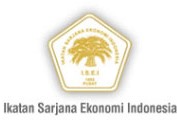Determinant of Foreign Direct Investment Inflows in Asean Countries
(1) Faculty of Economics and Business, Diponegoro University
(2) Faculty of Economics and Business, Diponegoro University
Abstract
Foreign Direct Investment (FDI) believed to be one of the instruments to reduce gap between the rich and the poor countries has considered Asian countries destination, including ASEAN Region. The aim of this study was to analyze factors affecting FDI in ASEAN countries (Cambodia, Indonesia, Malaysia, Philippines, Thailand, and Vietnam) during 2007-2016. The method used to analyze the data was multiple linear regression. The results indicated that market size, government integrity, and infrastructure quality positively affected FDI; wages and exchange rates negatively affected FDI; while, economic crisis had negative effect only in Malaysia. Meanwhile, economic openness, tax rate, and interest rate did not affect FDI inflow in ASEAN countries.
Keywords
Full Text:
PDFReferences
Abu.Bakar, Nor’Aznin, Mat, Siti Hadijah Che., & Harun, Mukaramah. (2012). The Impact of Infrastructure on Foreign Direct Investment: The Case of Malaysia. Procedia - Social and Behavioral Sciences, Vol. 65, 205 – 211.
Alba, Joseph D., Park, Donghyun & Wang, Peiming. (2009). The Impact of Exchange Rate on FDI and the Interdependence of FDI over Time. Asian Development Bank: Working Paper Series No 164.
https://www.adb.org/sites/default/files/publication/28254/economics-wp164.pdf.
Al-Sadig, Ali. (2009). The Effects of Corruption on FDI Inflows. Cato Journal, Vol.29 (2),267-294.
Bailey, Nicholas (2018) Exploring the Relationship between Institutional Factors and FDI Attractiveness: A Meta-analytic Review. .International Business Review .Vol.27 pp.139–148.
Banga, R. (2003). Impact of Government Policies and Investment Agreements on FDI inflows. Indian council for research on international economic relations,1-43.
http://citeseerx.ist.psu.edu/viewdoc/download?doi=10.1.1.853.5744&rep=rep1&type=pdf
Barassi, Marco R. & Ying Zhou (2012) The effect of corruption on FDI: A parametric and non-parametric analysis. European Journal of Political Economy. Vol.28,302–312.
Brahim, Mariem & Rachdi, Houssem. 2014.Foreign Direct Investment, Institutions and Economic Growth: Evidence from the MENA Region. Journal of Reviews on Global Economics, Vol.3,328-339
Bayar, Yilmaz & Alakbarov, Naib. (2016). Corruption and Foreign Direct Investment Inflows In Emerging Market Economies. Ecoforum Journal, Vol.5 issue (2) 9,303-308
Becker, Johannes. Fuest, Clemens & Riedel, Nadine (2012) Corporate tax effects on the quality and quantity of FDI Corporate tax effects on the quality and quantity of FDI. European Economic Review Vol.56,1495–1511.
Canare, Tristan. (2017). The effect of corruption on foreign direct investment inflows : Evidence from a panel of Asia-Pacific countries. The Changing Face of Corruption in the Asia Pacific :Curent Perspectives and Future Challenges Vol.(3),35-55
Caves, R. E. (1971). International corporations : The industrial economics of foreign investment. Economica, Vol. 38(149), 1-27.
Chakrabarti, A. (2001). The determinants of Foreign Direct Investments: Sensitivity analyses of crossâ€country regressions. Kyklos, Vol.54(1),.89-114.
Chen, Kun-Ming & RAU, Hsiu-Hua &LIN, Chia-Ching. (2006).The Impact of Exchange Rate Movements on Foreign Direct Investment: Market-Oriented versus Cost-Oriented. The Developing Economies. Vol 44. 269-287.
Chen, Zhihong.,Ge, Ying & Lai, Huiwen. (2010). Foreign Direct Investment And Wage Inequality: Evidence From China. World Development, Vol. 39(8), pp.1322–1332.
Cuervo-Cazurra, A. (2008). The effectiveness of laws against bribery abroad. Journal of International Business Studies, Vo.39(4),634-651.
Dias, Maria Helena Ambrosio. Dias, Joilson & Hirata, Johannes. (2014). Foreign Direct Investment in Brazil: The Effects of Productivity and Aggregate Consumption .Journal of Stock & Forex Trading Vol 3 Issue 3,1-5
Djankov, S., Ganser, T., McLiesh, C., Ramalho, R., & Shleifer, A. (2010). The effect of corporate taxes on investment and entrepreneurship. American Economic Journal: Macroeconomics, Vol.2(3),31-64.
Djankov, S., Glaeser, E., La Porta, R., Lopez-de-Silanes, F., & Shleifer, A. (2003). The new comparative economics. Journal of Comparative Economics, Vol.31(4), pp.595-619.
Donaubauer, Julian., Meyer, Birgit &Nunnenkamp, Peter. (2016). Aid, Infrastructure, and FDI: Assessing the Transmission Channel with a New Index of Infrastructure. World Development, Vol. 78,230–245.
Dornean, Adina &Oanea, Dumitru-Cristian. (2016). Impact of The Economic Crisis On FDI In Central and Eastern Europe. Review of Economic & Business Studies, Vol.8(2), pp.53-68.
Dunning, J.H. (1988): Explaining International Production, London: Unwin Hyman.
https://www.tandfonline.com/doi/abs/10.1080/08853908808523656?journalCode=uitj20
Echeverri, Herrera. Haar, H..J. &Bretón, Estévez J. B. (2014). Foreign direct investment, institutional quality, economic freedom and entrepreneurship in emerging markets. Journal of Business Research, Vol.67(9), 1921-1932.
Eshghi, Golpira&Eshghi, Abdolreza. (2009). Corporate Income Tax As A Determinant Of Foreign Direct Investment In Central And Eastern Europe. European Journal of Business and Social Sciences,Vol 4 (11),111 – 123.
Hansson, A., &Olofsdotter, K. (2004). Integration and tax competition: an empirical study for OECD countries. IIPF, Milano, 1-31.
http://portal.research.lu.se/portal/files/5675579/2061472
Haufler, A., &Wooton, I. (1999). Country size and tax competition for foreign direct investment. Journal of Public Economics, Vol. 71(1), 121-139.
Hunady, J., &Orviska, M. (2014). Determinants of Foreign Direct Investment in EU Countries–Do Corporate Taxes Really Matter?. Procedia Economics and Finance, Vol.12,243-250.
Hymer, S (1976) The International Operations of National Firms: A Study of Direct Investment, Ph. D. Thesis, MIT, 1960, Cambridge Mass, MIT Press.
Javorcik, B. S., & Wei, S. J. (2009). Corruption and cross-border investment in emerging markets: Firm-level evidence. Journal of International Money and Finance, Vol28(4), 605-624.
Jin, W., & Zang, Q. (2013). Impact of change in exchange rate on foreign direct investment: evidence from China. Lingnan Journal of Banking, Finance and Economics. Vol. 4,1 – 18.
Kahouli, Bassem&Maktouf, Samir. (2015). The determinants of FDI and the impact of the economic crisis on the implementation of RTAs: A static and dynamic gravity model. International Business Review, Vol.24, 518-529.
Kandiero, T & Chitiga, M. (2006) Trade openness and foreign direct investment in Africa .South African Journal of Economic and Management Sciences Vol 9, No 3, 355 – 370.
https://doi.org/10.4102/sajems.v9i3.1093
Khan, Muhammad Azam & Ahmad, SitiAznor. (2013). The Effects of Corruption on FDI Inflows: Some Empirical Investigation from Less Developed Countries. Journal of Applied Sciences Research, Vol. 9(6), 3462-3467.
Khandare, V.B. (2016). Impact of exchange rate on FDI: A comparative study of India and China. International Journal of Applied Research, Vol. 2(3), 599-602.
Krugman, P. R., &Obstfeld, M. (2006). International Economics: Theory and Policy: International Edition.
Kurniati, Y., & Prasmuka, A. Yanfitri. 2007. Determinan FDI (Faktor-faktor yang Menentukan Investasi Asing Langsung). BI Working Paper.
Le, Thai-Ha & Nam, Binh Tran (2018) Relative costs and FDI: Why did Vietnam forge so far ahead? . Economic Analysis and Policy 59 (1–13)
Leitão, N. C., & Faustino, H.C. (2010). Determinants of foreign direct investment in Portugal. The Journal of Applied Business and Economics, Vol.11(3), 1-8
McMullen, J. S., Bagby, D., & Palich, L. E. (2008). Economic freedom and the motivation to engage in entrepreneurial action. Entrepreneurship Theory and Practice, Vol.32(5), 875-895.
Miyake, Maiko & Sas, Magdolna.2000.Recent Trends in Foreign Direct Investmen. Financial Market Trends, No. 76, June 2000. Download:
https://www.oecd.org/daf/inv/investmentstatisticsandanalysis/2090168.pdf
Mudenda, Lackson Daniel (2015) Corporate Income Tax Rate and Foreign Direct Investment . The Case of Southern African Economies. Umeå University
Nerudová, D. (2011). Harmonizace daňových system zemà Evropské unie. Wolters Kluwer. Česká Republika
North, Douglass C. 1991.Institutions.The Journal of Economic Perspectives, Vol. 5, No. 1, 97-112.
Pearson, Dennis, Nyonna, Dong, & Kim, Kil-Joong. (2012). The Relationship between Economic Freedom, State Growth and Foreign Direct Investment in US States. International Journal of Economics and Finance, Vol.4(10), 140-146
Pradhana, Rudra P., Norman, Neville R., Badir, Yuosre & Samadhana, Bele. (2013). Transport Infrastructure, Foreign Direct Investment and Economic Growth Interactions in India: The ARDL Bounds Testing Approach. Procedia - Social and Behavioral Sciences, Vol.104, 914 – 921.
Quazi, R. (2007). Economic freedom & foreign direct investment in East Asia. Journal of the Asia Pacific Economy, Vol.12(3), 329-344.
Ramirez, Miguel D.2002. Foreign Direct Investment in Mexico During The 1990s: An Empirical Assesment. Eastern Economic Journal, Vol 28 No.3, 409-423.
Renani, Hosein Sharifi & Mirfatah, Maryam. (2012).The Impact of Exchange Rate Volatility on Foreign Direct Investment in Iran. Procedia Economics and Finance. Vol. 1, pp. 365-373
Romer, P. (1993). Idea gaps and object gaps in economic development. Journal of monetary economics, Vol.32(3), 543-573.
Rugman, Alan. (1986) New Theories of the Multinational Enterprise: An Assessment of Internalisation Theory. Bulletin of Economic Research, Vol.38 issue 2, 101-118
Sharifi-Renani, H., &Mirfatah, M. (2012). The impact of exchange rate volatility on foreign direct investment in Iran. Procedia Economics and Finance, Vol.1, pp.365-373.
Tomohara, Akinori&Takii, Sadayuki. (2010). Does globalization benefit developing countries? Effects of FDI on local wages. Journal of Policy Modeling, Vol.33(3), 511-521.
Uramova, Maria & Marcineková, Zuzana. (2008). Priane zahraniÄné investÃcie v kontexte regionálnej politiky. Region Direct, Number 1 issue No.1, 88-98.
Victor, Mphigalale Tshifhiwa. (2011). The impact of trade openness on foreign direct investment (FDI) inflows in emerging market economies. University of the Western Cape.
http://etd.uwc.ac.za/xmlui/handle/11394/5097
Wei, S. J. (2000). How Taxing is Corruption on International Investors?. Review of economics and statistics, Vol.82(1), 1-11.
Refbacks
- There are currently no refbacks.

This work is licensed under a Creative Commons Attribution 4.0 International License.






